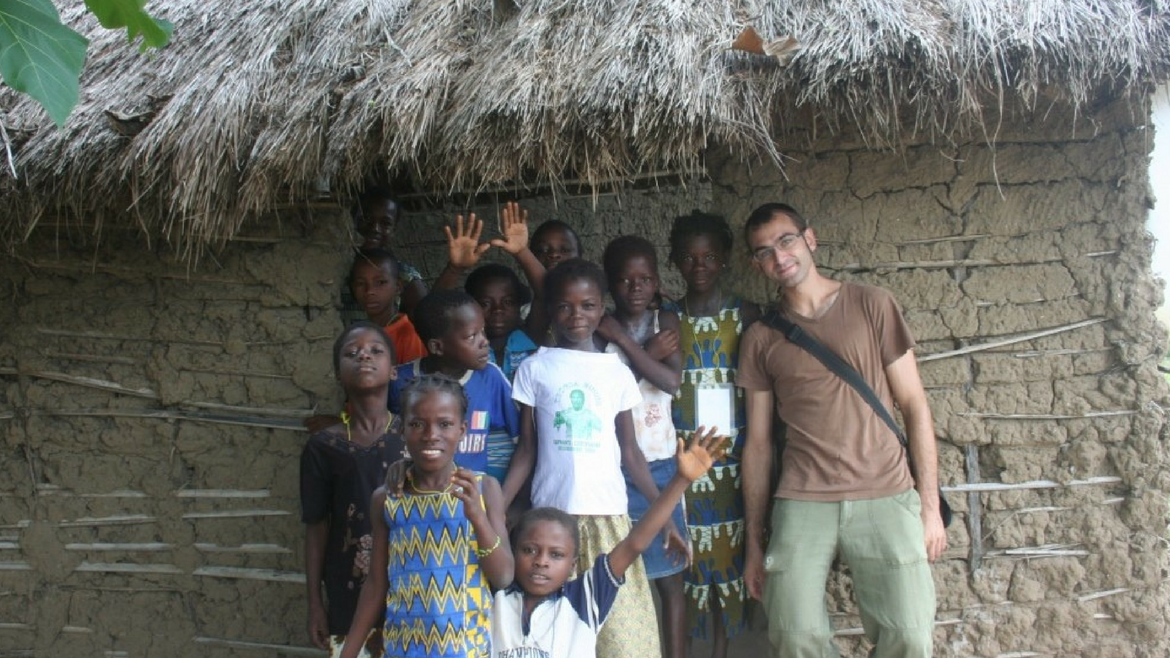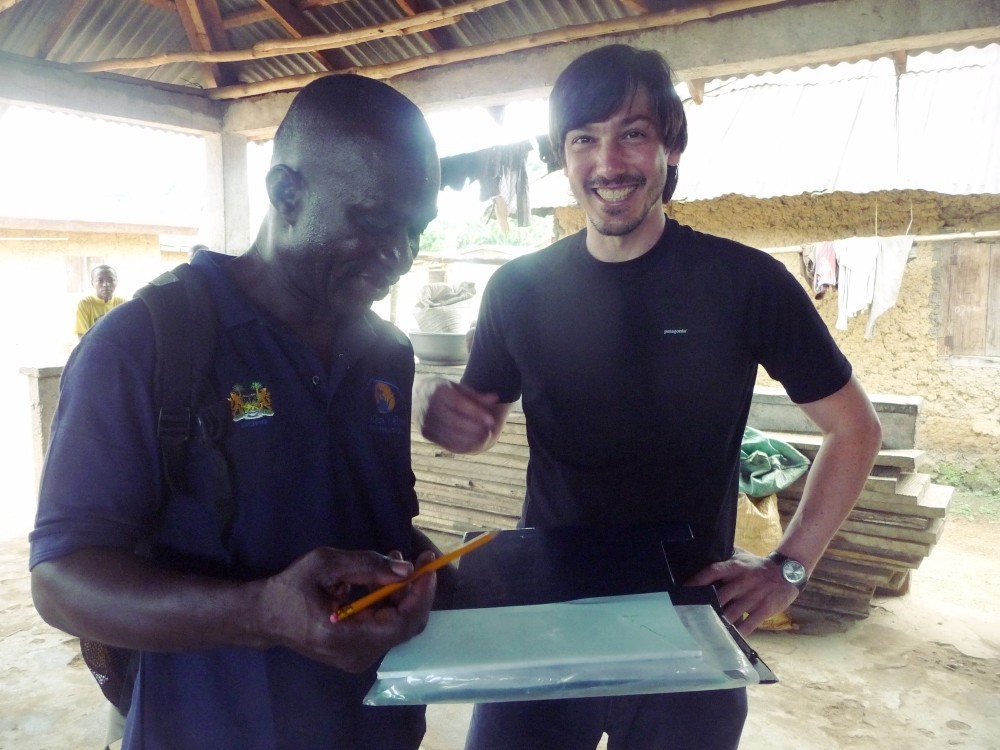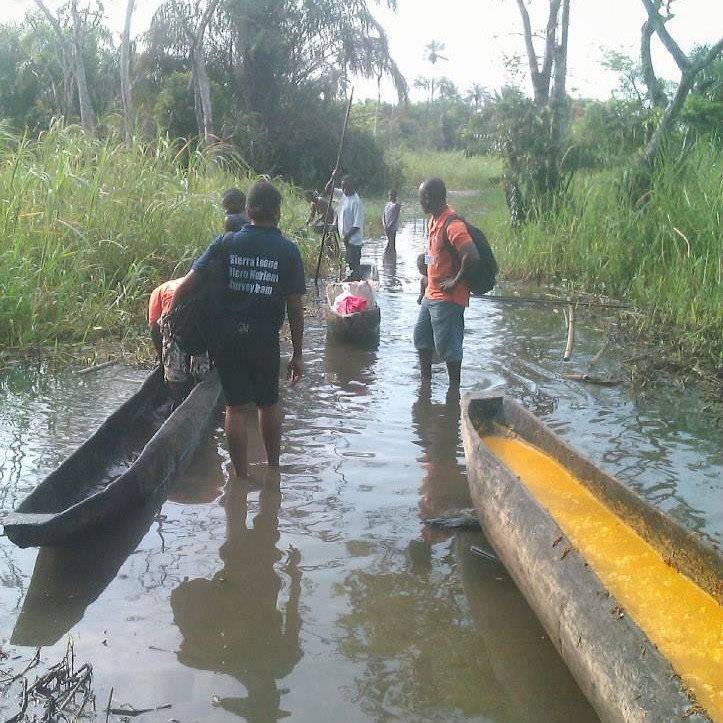By Holly McKee, published on 4th April 2016

Fabian during fieldwork in Central Côte d’Ivoire
In 2012, Fabian Rohner and James Wirth founded GroundWork, a company focused on designing and supporting nutrition surveys and implementing research projects. We are inspired by the work they do and share the vision of making nutrition tangible and impacts measurable. One of GroundWork’s main pillars is supporting micronutrient surveys. They have collaborated with BioAnalyt to facilitate micronutrient measurement on the ground and in remote areas. We talked to them about starting their own business, the journey so far, and where GroundWork is headed next.
How did everything get started?
James Wirth: We actually met when we shared a couch while waiting for our respective interviews at the Global Alliance for Improved Nutrition (GAIN) headquarters in Geneva. Even then, though we were potential rivals for the position, Fabian struck me as a really cool guy. We were both hired and 4 years later, in 2012, founded GroundWork together.
How was the idea to start GroundWork formed? What was the driving force?
Fabian Rohner: After having worked in academia and in a large international NGO, I was looking to conduct research that directly linked to improving situations. In large organizations, one’s work is often dependent on many factors: earmarked funds, strategic orientation, management decisions, etc. These decision pathways can be long and oftentimes frustrating. We founded GroundWork to support surveys and research once these organizational processes are completed and when organizational priorities are set, we are able to rapidly design what information needs to be collected when and according to what quality criteria.
James Wirth: While working together at GAIN, we found that there were very few consultants able to fully support the design and implementation of large-scale micronutrient surveys. There were few individuals or agencies that could design a scientific survey protocol as well as assist with the logistical piece of surveys, such as procuring supplies, training field workers, coordinating shipping of samples, etc. We toyed with the idea of starting our own company, thinking “Wouldn’t it be interesting to do something like this?!”
Fabian Rohner: Also, I wanted our personal circumstances, not the location of our headquarters, to determine where we all lived. As most nutrition surveys and research involve work in-country or computer work that can be done anywhere, we wanted everyone in GroundWork to choose where they wanted to be based. I’ve lived in Burkina Faso for the past 5 years, and being based there has been great personally as well as an asset to building our business.
The decision to start your own company takes some courage. How was it to taking the leap?
James Wirth: Starting GroundWork was really exciting and scary at the same time. We wanted to build a company that was really flexible and easy to manage; as non-profit organizations have a more complicated administrative structure, we decided being a for-profit company was best. Some friends offered to invest in us in the beginning, but we turned it down. We didn’t want to lose anyone else’s money. We wanted to take a lean start-up approach and see how that works, thinking “if our services are no good, we want to fail”. So it was really scary – there were times in the early days when we didn’t take a salary for 6 months while waiting to invoice a client. When we started, we thought that if we do this for one or two year and it dies, it will be at least a good story to tell. Now 4 years in we are doing well and about to get to the 5 year mark, which feels like a long time.
What inspired you to get into the nutrition field in the first place?
James Wirth: My progression is disjointed; my undergrad is actually in music. In the process of pursuing music, I got into NGO work in West Africa, doing work in microfinance and education. I became interested in food security and nutrition while pursuing a Master in Sustainable International Development in Boston. In addition to learning about nutrition, I got into surveys and data analysis. It sounds kind of nerdy, but nutrition first really interested me because many of the indicators are so clear. For example, you can measure iodine in salt, and you can measure a kid’s height and calculate his/her Z score. There is a threshold and everyone agrees upon it, making it easy to grab onto and easy to understand.
Fabian Rohner: While pursuing food science and engineering, I also took human nutrition courses. What got me really interested in nutrition is how it links up with health. The chance of being able to move something, in particular in populations that do not have the same opportunities that we do in terms of varied diet, inspired me. While working in the field, I realized that measuring what changes occur and what they mean to the population is very important in order to be able to make decisions about how to improve nutrition programs.
Looking at the publications on your website, GroundWork has produced a lot of content in only 4 years’ time–how do you do it?
James Wirth: As a small business, we have to work extremely efficiently, and since we are paid on deliverables, there is a clear incentive to get things done. There is a lot of pressure working like this, and that pressure produces a lot of content. We are really proud of all the publications that we’ve produced, and it shows that it is possible generate a lot of new data in only 4 years’ time.
Fabian Rohner: We are taking the approach of pooling expertise, which means that there is an overlap in the skill sets of our staff and we can bring consultants on board really easily. This lets us be responsive, something an individual consultant could not do. To successfully implement a large-scale micronutrient survey, a lot of pieces have to come together, and if you are not willing to run when you have to run, then opportunities are lost.

James with Momodu Massaquoi during field work in Eastern Sierra Leone
A national micronutrient survey is a huge undertaking, involving a lot of players. At what stage does GroundWork come in?
James Wirth: GroundWork is often brought into a survey project by one agency, but then collaborates with multiple stakeholders on the ground. What is really cool for those folks in country is that we are there from start to finish. If along the way there is something that they have not experienced before, it is a great advantage for them to be able to pick up the phone and say, “hey, in this situation what do we do?” In our work with other countries we have seen most of those situations so we can give guidance on how to resolve them.
GroundWork supported Sierra Leone’s national micronutrient survey in 2013 just before the outbreak of Ebola. How did that affect the outcome?
James Wirth: For Sierra Leone’s micronutrient survey we were working really closely with the Ministry of Health and Sanitation, WHO, UNICEF, and HKI. The field work was conducted in November-December 2013, and the Ebola outbreak started in early 2014. We were going to ship samples out for analysis, but due to a temporary ban on shipping biological specimen, there was a delay in getting the results. In Sierra Leone, it was the first time that a really comprehensive micronutrient survey had ever taken place. It was difficult, particularly since a cold chain had to be maintained despite poor roads. All the agencies and field workers did an incredible job. This shows that that a high-quality micronutrient survey can be pulled off anywhere. There is an incredibly talented and dedicated group of nutrition professionals in Sierra Leone; if you have people that are committed, a lot is possible.

The survey team in Sierra Leone taking boats to reach remote areas for sample collection
What were the findings of the survey?
Fabian Rohner: With respect to salt iodization and iodine status, we found that there was a high coverage of adequately iodized salt (~80%). We collected GPS points throughout the survey and produced some maps that show where the coverage of iodized salt was lowest. As you would expect, urinary iodine concentrations are lowest where the coverage of adequately iodized salt is also low. However, throughout the rest of the country, you have high levels of urinary iodine. Some people may assume that Sierra Leone would have high iodine deficiency, but since they have good salt iodization standards and most of the imported salt comes from countries with good iodization programs, this is not the case. The salt samples were measured in country by the Bureau of Standards using iCheck Iodine.
Looking towards the future – Where is GroundWork headed next?
James Wirth: We definitely love what we are doing and hope to support other national micronutrient and nutrition surveys. We are seeing that there is a big need to provide A to Z support on surveys as well as program evaluations. We recently started working on a project in Ghana that will use a market-based approach to promote micronutrient-rich foods to adolescent girls and pregnant women. We will be measuring the baseline, midline, and endline coverage of the project. In addition, we are trying to expand beyond nutrition. We are conducting a small study right now in Tanzania looking at the linkages between stunting and environmental enteropathy. There are some theories that suggest that child growth faltering may be linked to chronic inflammation of the gut resulting from poor water and hygiene conditions. We are also looking at the nutrition response to the Ebola outbreak.
Micronutrient nutrition is only one piece of the nutrition picture. We are trying to take a broader perspective on it and ideally expand the work that GroundWork can do outside of just nutrition specific – more towards nutrition sensitive work.

